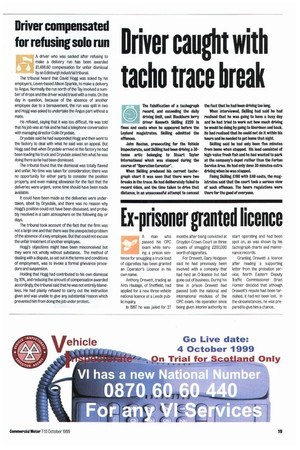A driver who was sacked after refusing to make a
Page 21

If you've noticed an error in this article please click here to report it so we can fix it.
delivery run has been awarded £1,4813.60 compensation for unfair dismissal by an Edinburgh industrial tribunal.
The tribunal heard that David Hogg was asked by his employers, Leven-based Alison Sparkle, to make a delivery to Angus. Normally the run north of the Tay involved a number of drops and the driver would travel with a mate. On the day in question, because of the absence of another employee due to a bereavement, the run was split in two and Hogg was asked to undertake the Angus part without a mate.
He refused, saying that it was too difficult. He was told that his job was at risk and he had a telephone conversation with managing director Colin Drysdale.
Drysdale said he had suspended Hogg and than went to the factory to deal with what he said was an appeal. But Hogg said that when Drysdale arrived at the factory he had been loading his truck and Drysdale asked him what he was doing there as he had been dismissed.
The tribunal found that the dismissal was totally flawed and unfair. No time was taken for consideration; there was no opportunity for either party to consider the position properly, and even making allowance for the fact that the deliveries were urgent, some time should have been made available.
It could have been made as the deliveries were undertaken, albeit by Drysdale, and there was no reason why Flogg's position could not have been discussed, and probably resolved in a calm atmosphere on the following day or days.
The tribunal took account of the fact that the firm was not a large one and that there was the unexpected problem of the absence of a key employee. But that could not excuse the unfair treatment of another employee.
Hogg's objections might have been misconceived but they were not wholly without substance. The method of dealing with a dispute, as set out in the terms and conditions of employment, was to invoke a formal grievance procedure and suspension.
Holding that Hogg had contributed to his own dismissal by 10%, and reducing the amount of compensation awarded accordingly, the tribunal said that he was not entirely blameless. He had plainly refused to carry out the instruction given and was unable to give any substantial reason which prevented him from doingthejob under protest.




















































































































